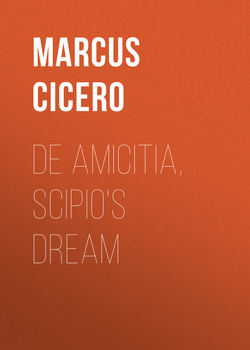Читать книгу De Amicitia, Scipio's Dream - Марк Туллий Цицерон, Marcus Cicero - Страница 2
SCIPIO'S DREAM
ОглавлениеPALIMPSESTS [Footnote: Rubbed again,—the parchment, or papyrus, having been first polished for use, and then rubbed as clean as possible, to be used a second time.]—the name and the thing—are at least as old as Cicero. In one of his letters he banters his friend Trebatius for writing to him on a palimpsest,[Footnote: In palimpsesto.] and marvels what there could have been on the parchment which he wanted to erase. This was a device probably resorted to in that age only in the way in which rigid economists of our day sometimes utilize envelopes and handbills. But in the dark ages, when classical literature was under a cloud and a ban, and when the scanty demand for writing materials made the supply both scanty and precarious, such manuscripts of profane authors as fell into the hands of ecclesiastical copyists were not unusually employed for transcribing the works of the Christian Fathers or the lives of saints. In such cases the erasion was so clumsily performed as often to leave distinct traces of the previous letters. The possibility of recovering lost writings from these palimpsests was first suggested by Montfaucon in the seventeenth century; but the earliest successful experiment of the kind was made by Bruns, a German scholar, in the latter part of the eighteenth, century. The most distinguished laborer in this field has been Angelo Mai, who commenced his work in 1814 on manuscripts in the Ambrosian Library at Milan, of which he was then custodian. Transferred to the Vatican Library at Rome, he discovered there, in 1821, a considerable portion of Cicero's De Republica, which had been obliterated, and replaced by Saint Augustine's Commentary on the Psalms. This latter being removed by appropriate chemical applications, large portions of the original writing remained legible, and were promptly given to the public.
This treatise Cicero evidently considered, and not without reason, as his master-work. It was written in the prime of his mental vigor, in the fifty-fourth year of his age, after ample experience in the affairs of State, and while he still hoped, more than he feared for the future of Rome. His object was to discuss in detail the principles and forms of civil government, to define the grounds of preference for a republic like that of Rome in its best days, and to describe the duties and responsibilities of a good citizen, whether in public office or in private life. He regarded this treatise, in its ethics, as his own directory in the government of his province of Cilicia, and as binding him, by the law of self-consistency, to unswerving uprightness and faithfulness, He refers to these six books on the Republic as so many hostages [Footnote: Praedibus.] for his uncorrupt integrity and untarnished honor, and makes them his apology to Atticus for declining to urge an extortionate demand on the city of Salamis.
The work is in the form of Dialogues, in which, with several interlocutors beside, the younger Africanus and Laelius are the chief speakers; and it is characterized by the same traits of dramatic genius to which I have referred in connection with the De Amicitia.
The De Republica was probably under interdict during the reigns of the Augustan dynasty; men did not dare to copy it, or to have it known that they possessed it; and when it might have safely reappeared, the republic had faded even from regretful memory, and there was no desire to perpetuate a work devoted to its service and honor. Thus the world had lost the very one of all Cicero's writings for which he most craved immortality. The portions of it which Mai has brought to light fully confirm Cicero's own estimate of its value, and feed the earnest—it is to be feared the vain—desire for the recovery of the entire work.
Scipio's Dream, which, is nearly all that remains of the Sixth Book of the De Republica, had survived during the interval for which the rest of the treatise was lost to the world. Macrobius, a grammarian of the fifth century, made it the text of a commentary of little present interest or value, but much prized and read in the Middle Ages. The Dream, independently of the commentary, has in more recent times passed through unnumbered editions, sometimes by itself, sometimes with Cicero's ethical writings, sometimes with the other fragments of the De Republica.
In the closing Dialogue of the De Republica the younger Africanus says: "Although to the wise the consciousness of noble deeds is a most ample reward of virtue, yet this divine virtue craves, not indeed statues that need lead to hold them to their pedestals, nor yet triumphs graced by withering laurels, but rewards of firmer structure and more enduring green." "What are these?" says Laelius. Scipio replies by telling his dream. The time of the vision was near the beginning of the Third Punic War, when Scipio, no longer in his early youth, was just entering upon the career in which he gained pre-eminent fame, thenceforward to know neither shadow nor decline.
* * * * *
I have used for Scipio's Dream, Creuzer and Moser's edition of the De Republica.
